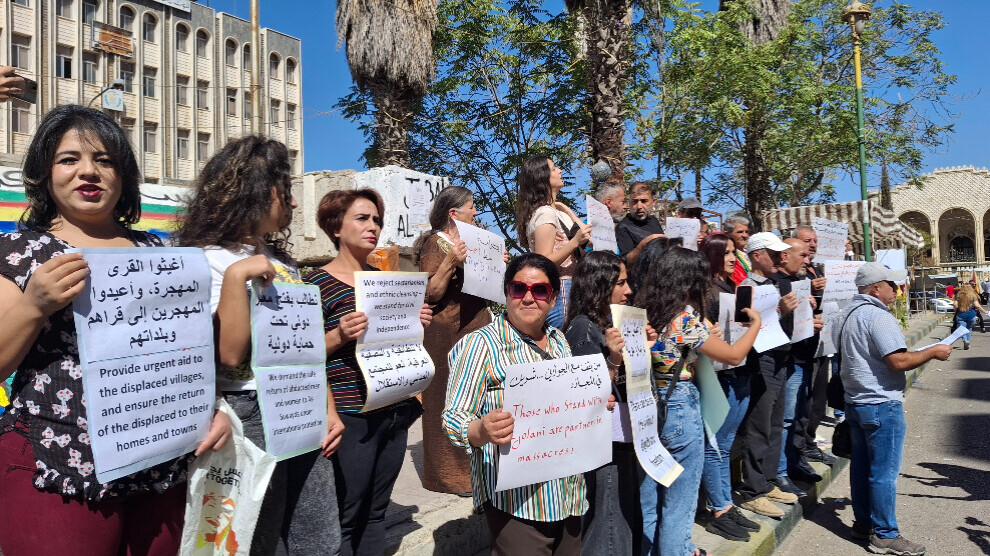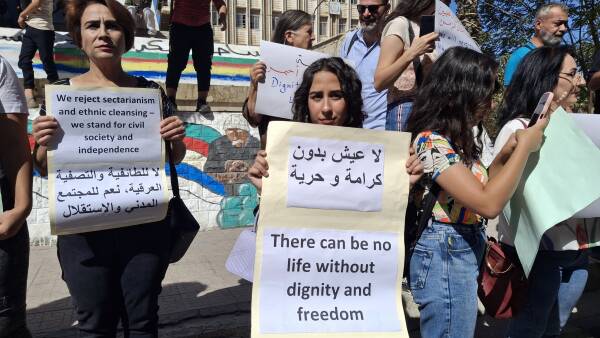Women of Sweida Call for International Action Amid Siege and Humanitarian Crisis
For the 12th week, women in Sweida lead protests in al-Karama Square, demanding the return of abducted civilians, a humanitarian corridor, and urgent aid as the province faces siege, hunger, and worsening living conditions.

ROCHEL JUNIOR
Sweida- For the twelfth consecutive week, women in the southern Syrian city of Sweida renewed their protest in al-Karama Square, standing shoulder to shoulder with local residents. They are demanding the return of kidnapped civilians, the opening of a humanitarian corridor, and the restoration of villages to their rightful owners, as the province continues to suffer under siege and worsening living conditions.
On Saturday, October 4, women gathered in large numbers, joined by families who voiced their determination to defend their civil and human rights. They called for urgent international intervention to deliver food and medical aid to the province, which is facing one of its most severe humanitarian crises in years.
Protesters stressed that the presence of a United Nations fact-finding committee in Sweida carries both political and humanitarian weight, particularly in documenting what they described as “violations” against civilians in recent months.
“We are here today in al-Karama Square to stand in full solidarity with our people, to raise our voices to the entire world, and to demand the immediate return of the abducted, as well as the opening of an international humanitarian corridor to guarantee aid delivery,” said Rima Khalifa from the local initiative Ahl al-Kheir (“People of Goodwill”). She emphasized that these are basic rights to independence and freedom.
Khalifa noted that so far, the only demand partially met has been the entry of the UN committee, but she expressed hope that the voices of Sweida’s women would be heard globally: “Everyone in the city must join these demonstrations and not be afraid to speak the truth.”
A suffocating siege, a humanitarian ordeal
For her part, Dala Abu al-Fadl described the humanitarian situation in Sweida as “catastrophic.” She explained: “The region has been under a suffocating blockade for more than two months, imposed by the so-called Syrian Interim Government. Essential food supplies, including flour, have run out. Aid convoys are blocked, fired upon, or forced to turn back. Medicine, including life-saving cancer treatments, has stopped arriving, deepening the suffering of civilians.”
She added that the people of Sweida are known for their dignity and peacefulness. “We don’t attack others, but we will not accept being attacked. Hunger and suffering cannot strip us of our dignity. We would rather starve than surrender it.”
Freedom and independence: a lasting demand

Maha Abu Raslan echoed that the protests are a continuation of the people’s demand for freedom and independence. “Sweida has not known stability for months due to repression and siege,” she said, recalling earlier demonstrations that lasted two years against the former Syrian regime. Today, she explained, the city seeks liberation from the forces they accuse of destroying the country—first and foremost, the hardline group Hayat Tahrir al-Sham (HTS), linked to the Syrian Interim Government and led by Ahmad al-Shar’a (known as al-Jolani).
Abu Raslan stressed that their demands include uncovering the fate of the kidnapped and ensuring university students can return safely to their families, despite the crushing conditions. She welcomed the arrival of the UN fact-finding team, expressing hope that it would produce tangible results to expose violations. “We will continue to gather in the square every Saturday until our demands are fully met,” she vowed, urging the international community to pay attention and amplify the protesters’ voices.
‘Bread, schools, and safety’
Sarah Azzam, another protester, underlined the urgent need for a humanitarian crossing and the release of kidnapped women. “Sweida is without flour, without bread, without food. We demand our right to return to schools and universities, and to live in safety. We will keep protesting until our voices are heard and our demands are met,” she said.
She noted that many students have been unable to reach their universities due to road closures and the dangers of travel. The prolonged blockade, she warned, threatens the future of an entire generation.
